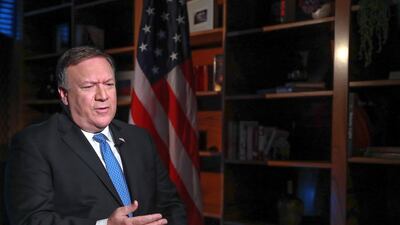Saudi Arabia and UAE are taking “demonstrable actions to reduce the risk of harm to civilians” in the Yemen conflict, US Secretary of State Mike Pompeo told Congress on Wednesday.
That "certification" was required by new legislation requiring Mr Pompeo to inform lawmakers every six months whether he believed the Arab coalition was doing enough to protect civilians and bring an end to its war against Houthi rebels.
At stake was US support to the coalition, which includes supplying advanced weaponry, sharing intelligence and offering aerial refueling to Gulf warplanes.
“I certified to Congress yesterday that the governments of Saudi Arabia and United Arab Emirates are undertaking demonstrable actions to reduce the risk of harm to civilians and civilian infrastructure resulting from military operations of these governments” Mr Pompeo said.
Shortly after, Defence Secretary Jim Mattis, who was in the UAE last Friday, backed Mr Pompeo. "I endorse and fully support Secretary Pompeo's certification to the Congress that the governments of Saudi Arabia and United Arab Emirates are making every effort to reduce the risk of civilian casualties and collateral damage to civilian infrastructure resulting from their military operations to end the civil war in Yemen”.
Earlier this month, Mr Mattis had said that US logistical and fueling support was not unconditional. But on Wednesday he said: “The Saudi-led coalition's commitment is reflected in their support for these UN-led efforts…to achieve a negotiated end to this fighting.”
Mr Pompeo, Mr Mattis and the director of national intelligence Dan Coats will shortly brief Congress on the US role in Yemen, which comes amid growing concern from a bipartisan group senators over Washington’s involvement in the three-year-war.
The United Nations special envoy to Yemen Martin Griffiths also met with US lawmakers last month to update them on the political process towards ending the war.
______________
Read more:
Mukalla: The Yemeni city that defeated Al Qaeda and now needs the world's help
UN Yemen envoy to visit Sanaa, Riyadh and Muscat after Geneva talks setback
Yemen pro-government forces cut major Houthi supply route
______________
Separately, UAE Ambassador in Washington Yousef Al Otaiba made a case for continued US-UAE cooperation in Yemen to defeat extremists. Writing in the Washington Post, Mr Otaiba hailed successes against Al Qaeda in the Arabian Peninsula (AQAP). He referenced the killing of Al Qaeda master bomb-maker Ibrahim Al Asiri last month in a "a closely coordinated intelligence and military operation between the United Arab Emirates and the United States."
When the war started in 2015, Mr Otaiba argued, AQAP was riding high. Now, he added, it lost more than 2,000 hardcore militants from the battlefield, and Yemen is seeing “improved security, and delivered humanitarian and development assistance to the port city of Mukalla and other liberated areas.”
But the senior diplomat cautioned that AQAP is not the only threat in Yemen. “The other is Iran and its Hezbollah-like proxy group, the Houthis, who triggered the current political and humanitarian crisis in Yemen” when overthrowing the government in 2015.
Mr Otaiba accused Iran of “providing the Houthis some of most sophisticated weaponry” that includes “anti-ship missiles and remotely guided explosive boats launched at naval vessels and commercial oil tankers; hundreds of ballistic missiles, rockets and armed aerial drones targeting cities and civilians in Saudi Arabia; and more than half a million landmines and improvised explosive devices indiscriminately placed with devastating consequences to the Yemeni people.”
He said the UAE, as part of a larger Arab coalition, “is making significant progress against the Houthis. Large parts of southern Yemen have been liberated. Much of the Red Sea coast is secured with the focus now on Hodeida, the last major port under Houthi control.”
Mr Otaiba lambasted Qatar’s role in Yemen “as the favored benefactor of Islamic extremism”.
“Sheikh Tamim Bin Hamad al-Thani, the emir of Qatar, called Iranian President Hassan Rouhani to offer Qatar’s support with expanded maritime cooperation, investment incentives and construction contracts” he said.
Mr Otaiba accused Qatar’s flagship Eid Charity of lavishing millions in Yemen on “designated AQAP ringleader Abd al-Wahhab al-Humayqani, who previously worked in Qatar’s ministry of religious affairs.”
The Qatari embassy in Washington, contacted by The National, was not immediately available for a comment.










